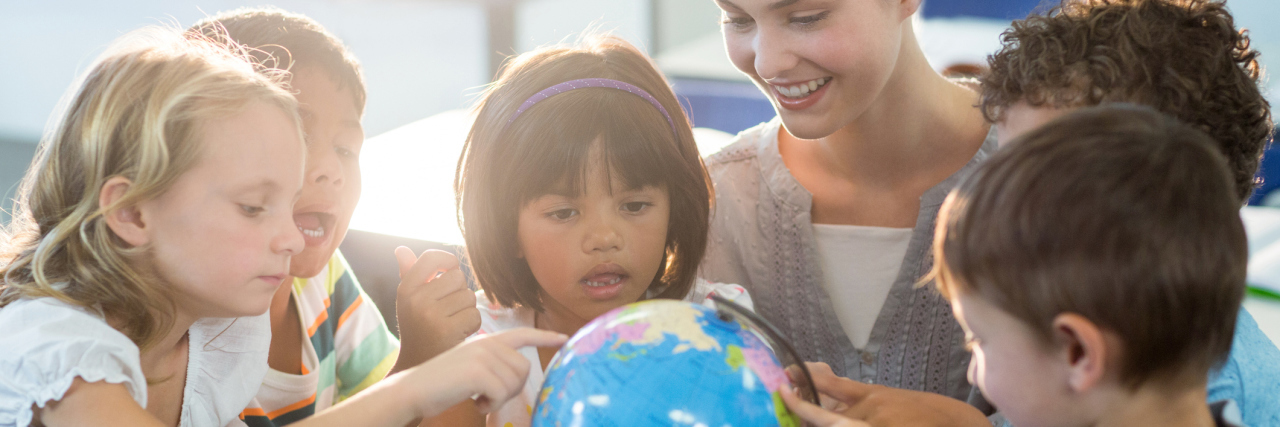The Surprising Childhood Event That Made Me Suspect I'm on the Autism Spectrum
I have been teaching special education for about four years now. When I first began my job, I was told that most of the students I would have in my class were on the autism spectrum. Eager to prepare myself for the challenge of teaching these kids, I became fixated on researching and reading all about children with autism.
Autism hadn’t really been “on my radar” for most of my life. I had a classmate with cerebral palsy in elementary school, but other than that, there weren’t a lot of kids with disabilities in my small town. There were, however, those few really awkward kids with limited social skills who, looking back, may have been undiagnosed autistics.
Full disclosure: I was totally one of those awkward kids.
During my research on autism, I came across an article on the surprisingly different ways autism manifests in girls. One of the people interviewed for the article mentioned that her parents had taken her to have her hearing checked when she was young. Her parents were concerned about how she did not respond when they repeatedly called her name.
I was shocked.
I lived in Oklahoma on and off during my childhood, but during my stay from 1989 to 1992, my mother insisted that my father take me to a specialist to get my hearing checked. She told him she would call and call for me, standing in the staircase, right below my room, and I would not seem to hear her. She would have to walk all the way up the stairs and actually come into my room to get me. She hadn’t had that problem when we lived in a one-story house and she could just walk down the hall to my room. I also had a speech impediment at the time, which could have been been related, if I did happen to have any hearing loss.
So my father and I traveled to Lawton, about an hour away from where we lived at the time, to visit an audiologist. At the appointment, they asked me to wear a big pair of headphones and respond to a variety of tones. I heard every single one perfectly.
Autism wasn’t very well-known in the early 90s. Knowledge of Asperger’s or so-called high-functioning autism was even rarer, and autism was still thought of as a condition that mostly affected boys. The chances of that audiology appointment leading to a referral to talk to a psychiatrist or neurologist about autism were basically zero.
So I spent the rest of my childhood just being different. I preferred to play alone, or I would voraciously read books alone in my room. I copied the mannerisms and language of whoever was my best friend at the time. I obsessed over animated movies, celebrities and boys I liked. I collected art supplies that I rarely used but still desperately needed. I flapped my hands when I got upset — not all the time, just when I was close to melting down. I was torn between wanting to keep others around me happy (so they wouldn’t yell at me) and wanting things the way I wanted them.
I know now, after continuing my research, that my limited response to my mother’s calls likely stemmed from delays in verbal and auditory processing. My processing delays are especially amplified when I’m fixated on something. Simply put, when I’m super focused on something I love, it can drown out the world.
Now, as an adult, I’m discovering so many parts of myself that I share with other autistic people. Reading their stories online has explained so much about my life. The way I can lose myself in researching something for hours, and then follow it up by talking about it so much, so quickly I can actually lose my breath. My inability to share singular details without telling the entire backstory leading up to it. My aversions to certain sensory input, like bright lights and loud noises, and the opposing sensory-seeking and stimming behaviors, like wrapping myself in my comforter or squeezing my fingers.
My research on autism ended up not only helping me to better connect with and teach my autistic students, but it also helped illuminate my life. Now I can make changes based on what I know to make my life a little easier — sunglasses when it’s too bright, headphones when it’s too loud, removing myself from chaotic environments when I get too overwhelmed.
I am currently in the process of pursuing an official diagnosis of autism. I have spent several days this summer gathering stories, recalling childhood memories, and writing down countless examples that illustrate how I’m most definitely on the spectrum. For a while, I wasn’t sure I needed an official diagnosis. My research alone has already taught me so much about myself. But with a diagnosis, I think I’ll feel more comfortable telling people in my life that I’m not weird or “crazy” — I’m just wired a bit differently.
And my story will start with one surprisingly trip to the audiologist.
We want to hear your story. Become a Mighty contributor here.
Thinkstock photo by Wavebreak Media.

